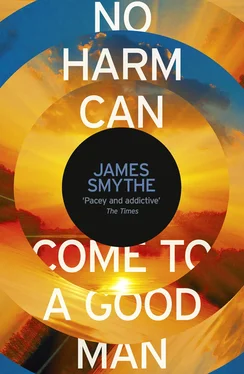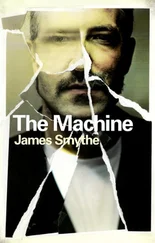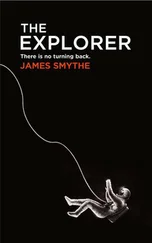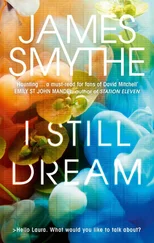‘I’m sorry,’ the doctor says. That’s all they need. Laurence holds Deanna, and he cries into her shoulder, and he falls to his knees and he screams but it comes out like he’s gasping for air; but Deanna cannot soothe him. She is still picturing Sean stuck under the water, looking up at her, calling his father’s name, desperately clawing at the surface of it, unable to break out; knowing what is coming as he drowns.
3 Chapter 3 Chapter 4 Chapter 5 Chapter 6 Chapter 7 Chapter 8 Chapter 9 Part Two Chapter 10 Chapter 11 Chapter 12 Chapter 13 Chapter 14 Chapter 15 Chapter 16 Chapter 17 Epilogue Acknowledgements About the Author Also by James Smythe About the Publisher
The next year is the worst of their lives.
The funeral happens a week to the day after his death. Sean’s skin was a shade of gray when they looked at it in the hospital. The make-up artist tells them he is one of the best and Laurence wonders what scale that’s on: town, or state, or country, or even the world. He asks, bitterly, if there are competitions to decide such a thing: a parade of bodies lined up to be perfumed and preened? When they finally see Sean, his skin is the abnormal pink of a child’s doll. They refuse an open casket, then, because this isn’t their son any more. Laurence can’t stand to look at him, or even at the casket as it lies on the table. They invite anybody who wants to come to the funeral, and pretty much the whole town does. They all bring trays of pies and pasta and salads, and they leave them piled up in the kitchen, shake Laurence’s hand and kiss Deanna’s cheek, say how sorry they are. Everybody in the town knows them; most remember Deanna from when she was a child. And they all knew Sean, and they all want to say goodbye to him. Everybody steps up to the closed box on the table and stands over it; they tell Sean whatever it is that they have to say. Alyx doesn’t come, because Deanna doesn’t know if that’s right. Deanna explains it to her.
‘Sean’s gone to heaven,’ she says, almost without thinking, and that starts a conversation that she then feels pitiably unable to deal with, but she tries. She buys a Bible for the express purpose of giving Alyx the story about how it works. She argues with Laurence that grief needs an outlet and that this might be a good one for Alyx. Laurence doesn’t like it – he’s practical about religion, pragmatic, as badly as that plays with the South; and now he’s more stubborn. Any shot at belief that he maybe once had is devastated by the loss of their son – but, Deanna argues, that’s beyond the point. The point is: Alyx needs it. She was a twin, and she is now missing the person she was closest to in the whole world. She’ll never know that closeness again.
Once Sean is finally put into the ground, Deanna and Laurence take the girls to his grave, to do something that’s small and private and just for them. They stand around the stone – the dates make Deanna feel sick to look at, so she avoids that – and they all tell stories about Sean and why they loved him. They have decided to bring some of his toys, to put them in the soil with their hands. Alyx buries one of her own toy ponies, the one that Sean always used to steal when he was younger; Lane chooses a dinosaur that he claimed he didn’t like any more, but that he had absolute trouble letting go of as he grew older. They don’t say why they’re doing it, but they think that it might help. As they bury them, scooting the soil on top of them, pushing them under, Deanna feels a rip in herself: so much of her beloved son now relegated to the ground. She will miss the toys, because they would have reminded her of him. She thinks about coming back at night, when the rest of them are asleep, and pulling them from the soil; but she wonders where she would stop, or if she would just keep on digging.
They sit Alyx down and ask if she would like to talk to anybody about her brother, because they’ve heard too many stories about what happens if children are left to bottle up their emotions, how dangerous it can be. They hire a therapist, a specialist in childhood bereavement, and Lane is allowed to do whatever she wants for a while. Three weeks after her brother’s death, Lane shaves her head almost down to nothing and she doesn’t bat an eyelid when Laurence shouts – screams – at her about it.
‘We had a deal!’ he yells, and she doesn’t respond or even acknowledge it. Deanna’s listening and that evening they have a conversation about his career.
‘What was that about?’ she asks, when he gets off the phone then, because they haven’t yet spoken politics yet. She had assumed. They’re in bed and he’s propped up like always, tablet on his lap. The ClearVista survey deadline has long expired; all of that stuff was forgotten in an attempt to find relative peace in the wake of Sean’s death.
‘The delegates called,’ he says. ‘They still want me to run.’
‘This year?’
‘I don’t know,’ he says. ‘I haven’t thought about it. I don’t know.’ She knows that this works in the party’s favor; that their loss will be used, Sean an inadvertent sacrifice to the voting gods.
They have The Daily Show on as they lie in bed and they both laugh at the same joke and immediately feel guilty, as if they’ve forgotten too quickly about Sean. Then Jon Stewart starts talking about Homme’s laughable efforts at beginning a campaign. He mentions Laurence dropping out and then he looks to the camera, full of actual sincerity, and sends out his best wishes to the Walker family. No jokes: just an appreciation of their tragedy. When they switch the set off, Deanna tries to sleep, but she imagines that she’s drowning: she can see the sky above her, but the water is between her and it, a fluid mass of tropical blue that’s destined to do nothing but end.
Amit, the man who would be Laurence’s Chief of Staff, comes to the house with a plan. It’s a year-long breakdown of their lives: of the things that they have to do and how they might set about moving everything forward. He doesn’t mention Sean either, but the boy is there, floating in the air above them. Everything that Amit says is tinged with the knowledge of how this might have been before and how it will be now. He has an argument that makes Deanna feel sick to hear: that this is a chance for Laurence to do something truly good, a chance to use his awful situation to his advantage. The words aren’t Amit’s: they come from the delegates, Deanna knows. They’re desperate to harness this. The tragedy can mark every facet of the campaign, should Laurence choose to step up again: the charities that he will vouch for; the events that he will attend; every single time that he mentions the word family in a speech. Nobody will be able to forget what has happened. Deanna is about to start arguing: that Laurence shouldn’t be running, that the family needs him, when Lane comes home. She walks into the kitchen in front of them and doesn’t say a word. A month after her brother has died and she’s tattooed herself again: this time across her right shoulder blade, a single word. It isn’t announced, but it’s flaunted, red and angry, on her thin skin, so much bigger than her past tattoos. Her parents freak out, shouting at her, and they get close to read it. She lets them, because this will happen sooner or later. It’s her brother’s name, clear as anything, in a slick, italicized script, framed on a bed of flowers and leaves, a vine stretching out and away from them. It leaves them breathless. Lane leaves the house again without saying a word.
In bed that night, Deanna asks Laurence how they can be angry with her for it. She wishes it was something else: a swear word, or the name of one of the stupid bands again. That would make it easy to have something to rally against. This, though? It’s grief, manifested as words and made indelible.
Читать дальше












